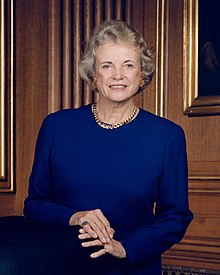Sandra Day O’Connor: Pioneering the Path to Equality

In the tapestry of Women’s History Month, the name Sandra Day O’Connor shines brightly—a trailblazer whose historic achievements shattered barriers and paved the way for future generations of women in the legal profession and beyond. As we celebrate her legacy, let us delve into the remarkable life of this pioneering figure and the profound impact of her advocacy.
Born on March 26, 1930, in El Paso, Texas, Sandra Day O’Connor grew up on a cattle ranch in Arizona, where she developed a strong work ethic and a deep appreciation for the law. After graduating from Stanford Law School in 1952, O’Connor faced formidable obstacles as a woman entering a male-dominated field. Despite the challenges she encountered, O’Connor persevered, carving out a successful career as a lawyer and judge.
In 1981, Sandra Day O’Connor made history when she was appointed by President Ronald Reagan as the first female Associate Justice of the United States Supreme Court. Her confirmation marked a historic milestone for gender equality and judicial diversity, and O’Connor quickly earned a reputation as a thoughtful and pragmatic jurist.
Throughout her tenure on the Supreme Court, Sandra Day O’Connor was a pivotal figure in shaping the direction of American jurisprudence. She authored numerous landmark opinions on a wide range of issues, including civil rights, reproductive rights, and the separation of powers. O’Connor’s commitment to fairness, pragmatism, and the rule of law earned her bipartisan respect and admiration.
Despite her groundbreaking achievements, Sandra Day O’Connor faced considerable challenges and obstacles in her career. As the lone woman on the Supreme Court for many years, she often found herself in the minority on contentious issues and faced criticism and scrutiny from both colleagues and the public. Yet, O’Connor remained undeterred, her resolve strengthened by her conviction that justice should be blind to gender, race, and politics.
One of Sandra Day O’Connor’s most significant contributions to the law was her pivotal role in shaping the Court’s jurisprudence on gender equality. In cases such as Planned Parenthood v. Casey (1992) and United States v. Virginia (1996), O’Connor’s opinions helped to reaffirm and expand the constitutional protections afforded to women’s rights and gender discrimination.
As we celebrate Women’s History Month, let us honor the enduring legacy of Sandra Day O’Connor—a woman whose courage, intellect, and unwavering commitment to justice continue to inspire us all. May her life serve as a reminder of the power of perseverance, the importance of diversity, and the enduring quest for a more just and equitable society for all.
Sign up for Kristy's Newsletter!
Get all the updates on upcoming books and events!
